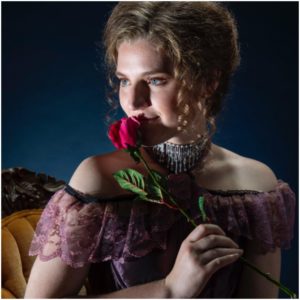
Pocket Opera 2018-19 Review: La Rondine
With Erin O’Meally Leading The Way, This Is A Delightful Showcase Of Puccini’s Late Period Opera
By Lois SilversteinPuccini’s “La Rondine” soared out of Berkeley’s Hillside Club Sunday afternoon, in full flight. Pocket Opera, under the artistic direction of Nicholas A. Garcia and music director David Drummond, gave voice to its bittersweet charm. With the Pocket Philharmonic tucked neatly upstage and the small cast of ardent singers weaving in and out of a petite and well-designed set, the performance gave us pure pleasure.
From Montserrat Caballé, Renée Fleming, Angela Gheorghiu, among others, sopranos have coveted Magda’s gorgeous arias. Roberto Alagna, Jonas Kaufmann, among others, have reached for Ruggero’s luminous ones.
Opera singers Erin O’Meally and Patrick Hagen did the honors here.
Stars Of the Night
Thrice-award winner O’Meally (E.B. Opera League, James Toland Voice Competition, the Holt Scholarship, all 2018-to the present) and Hagen tossed considerable stardust into the ring. Sensuous and appealing, O’Meally’s voice easily filled the small hall. Although occasionally her volume usurped her finest modulations, her clarion tone transmitted ardor and excitement. With Hagen she displayed loveliness and grace. In her shimmering mauve-plum dress and filigreed accoutrements, she surely looked the part of the Parisian demoiselle. That said, sometimes she performed the part, however, rather than expressed it with greater depth; many times her performance seemed to rely heavily on more superficial facial expression, gesture, physical movement.
Patrick Hagen, while not having to handle as much sound as his Magda, offered a curled, deep and resonant timbre in expressing his love for his beloved. Warm and inviting, Hagen’s Ruggero sang with persuasion as he gazed at Magda, touched her hand, brushed her cheek, kissed her lips. His smile conveyed ardor. His courtship was gentle and generous. He was one-in-one with his character and his heart.
Only at the finale, when his loss of Magda overcame him, did he falter somewhat. Short-shrift his goodbye, even as it was inevitable, cut short. Just as Violetta and Alfredo in “La Traviata” took their time, our lovers, especially Ruggero, needs to spin it out further.
Well-Matched
Liesl McPherrin and Samuel Faustine sang as a well-matched pair the roles of Lisette and Prunier. McPherrin gave the role a feisty, comic and a well-plumbed performance. Her stage ease communicated wit and salt, and so did her rich and expansive voice. Occasionally, she sounded shrill, but this quickly dissipated in her vivacious high-jinx and flexible resonance.
Faustine’s Prunier was a well-cast as the poet, and he moved gracefully along the arc of the role. Affable and charming, the performance was easy to hear and enjoy, despite a short lapse in upper register.
Baritone Julio Ferrari performed Rambaldo with the right amount of “glace,” and Chris Langton essayed Perichaud with deftness and companionability. His light two-stepping of the chorus women center stage in Act two, added a jaunty touch.
The Chorus of Parisiens sang the Puccini score with easy lyricism, amplifying and enhancing the musical ambience. The Childrens Chorus gave an added dimension to the scene. Surely we were in a French cafe; surely we were comfortably seated or twirled around the petite dance floor with light-heartedness and romance. Never did we feel cramped or crowded.
Intelligent Division
Nicholas A. Garcia saw to that with the intelligent division of the stage into quadrants of intimacy, also conveyed sufficient amplitude. Even the small table on the platform not only set the stage for the lovers’ rendezvous, but gave us a close-up we could savor. The illusion of fullness and texture with visible ease heightened audience involvement, as did the chorus members’ downstage appearance at the end of Act two and the entrance of Prunier and Lisette in the final Act.
Subtle pinks and beiges dominated the costume palette and gave an aesthetic patina to the “fin de siecle” style. It was Post-Impressionism on a modest scale.
The music more than came through. The orchestra featured just 10 performers – strings, winds, percussion, piano, played by Drummond as he conducted – who offered more than the singular musical line. It was Puccini all right and with an apt flowing line. The bassoon and clarinet alone offering the resonant sound.
This was a delightful performance to savor and to remind us of just how much fine work is being done in this opera world we so love. Pocket Opera, despite not relying on the largest of budgets, put together a commendable performance of a work that deserves more presentations around the world.


